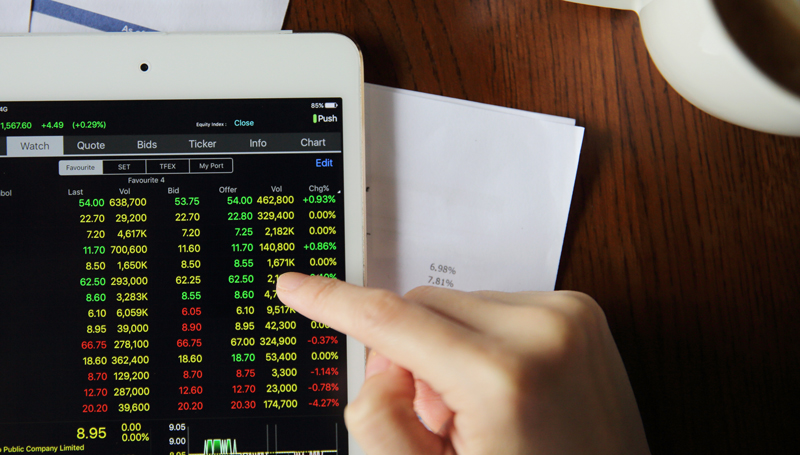

21.01.2020 – Daily Report. Unexpected neck blow for investors in Asia: fear of a deadly lung epidemic has pulled prices sharply south. Brokers in Germany are also predominantly pushing the sell button.
Frankfurt in reverse gear
Only a few traders had this threat on their radar: the spread of a new type of virus-induced lung disease in China is unsettling investors. The DAX fell by 0.5 percent to 13,487 points in early Tuesday trading. The indicator thus moved further away from its record high of 13,596 points, which it reached about two years ago. The strong ZEW economic data only supported the prices a little.
US futures also fell by 0.4 percent. Government bonds and the Japanese yen were in demand as safe havens. There were no specifications from the USA for the DAX: The American stock exchanges remained closed yesterday because of the holiday “Martin Luther King Day”.
Threatening epidemic in China
In the People’s Republic of China, the CSI-300 dropped by a whopping 1.7 percent to 4,114 points in the morning. Brokers explained the development with the outbreak of the corona virus and four deaths. The disease, which resembles pneumonia, could cause considerable damage to the retail trade and tourism, the floor said. Some stock market experts drew parallels to related epidemics such as SARS and MERS. The situation appears to be more dangerous than previously suspected.
China’s President Xi Jinping said yesterday, according to the state TV station CCTV, that the outbreak must be taken seriously. Also on state television, scientist Zhong Nanshan, head of a commission investigating the disease, confirmed that it is now certain that the epidemic can be transmitted from person to person. Previously, only animals – specifically the fish market in Wuhan – had been considered a source of infection. According to the “Wall Street Journal”, the number of confirmed cases in the Middle Kingdom has now tripled to over 200. And this before the great wave of travel to the Chinese New Year. First cases have also been reported in Thailand, Japan and South Korea. The World Health Organization has now convened its Emergency Committee because of the diseases.
In Hong Kong, the continuing protests also depressed the mood. As a result, the Hang Seng fell particularly sharply by 2.8 percent to 27,985 points.
Japan’s central bank stands still
In Japan, the Nikkei 225 lost 0.9 percent to 23,864 points. As expected, the Japanese central bank did not touch the key interest rate of minus 0.1 percent. The goal remains to push the yield on ten-year government bonds towards zero. At the same time, the central bank raised its economic forecast by 0.2 points to 0.9 percent, justifying the move with the reduced risks in the course of Phase 1 between China and the USA.
Institutions sell oil
Oil prices continued to fall, WTI lost 1.5 percent to USD 57.81, Brent slipped 1.1 percent to USD 64.39. According to an analysis by Reuters, many major speculators have exited their long positions after the situation between Iran and the USA calmed down. By 14 January, fund managers had sold the equivalent of 64 million barrels of WTI futures.
Short process in Impeachment
For brokers, the question could become interesting in the coming days as to whether the majority of Republicans in the Senate will push through a short trial; or whether there are defectors who, just like the Democrats, now want to summon witnesses in impeachment after all. If so, the stock market is likely to interpret this as a signal that there is a crack in the Republican faction. And that US President Donald Trump is in danger – which would be a bearish signal for Wall Street. A quick acquittal, on the other hand, would be a bullish factor for anyone trading CFDs on US indices or online US stocks.
What the day brings
The diary does not show any really big events on Tuesday, you can find the overview as always here: Market Mover
The Bernstein-Bank wishes successful trades!
Important Notes on This Publication:
The content of this publication is for general information purposes only. In this context, it is neither an individual investment recommendation or advice nor an offer to purchase or sell securities or other financial products. The content in question and all the information contained therein do not in any way replace individual investor- or investment-oriented advice. No reliable forecast or indication for the future is possible with respect to any presentation or information on the present or past performance of the relevant underlying assets. All information and data presented in this publication are based on reliable sources. However, Bernstein Bank does not guarantee that the information and data contained in this publication is up-to-date, correct and complete. Securities traded on the financial markets are subject to price fluctuations. A contract for difference (CFD) is also a financial instrument with leverage effect. Against this backdrop, CFD trading involves a high risk up to the point of total loss and may not be suitable for all investors. Therefore, make sure that you have fully understood all the correlating risks. If necessary, ask for independent advice.
